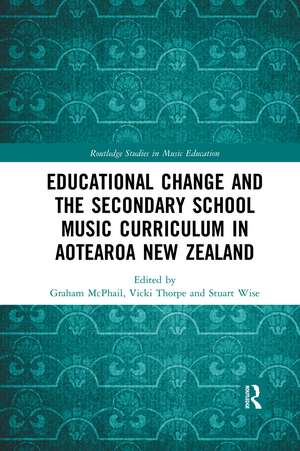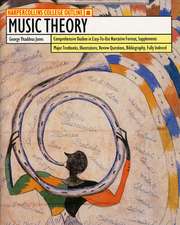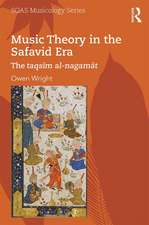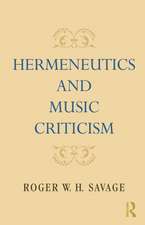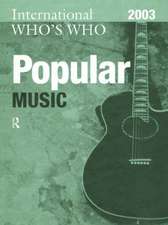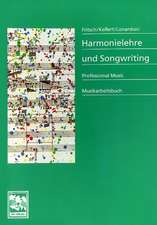Educational Change and the Secondary School Music Curriculum in Aotearoa New Zealand: Routledge Studies in Music Education
Editat de Graham McPhail, Vicki Thorpe, Stuart Wiseen Limba Engleză Paperback – 14 aug 2020
| Toate formatele și edițiile | Preț | Express |
|---|---|---|
| Paperback (1) | 385.84 lei 6-8 săpt. | |
| Taylor & Francis – 14 aug 2020 | 385.84 lei 6-8 săpt. | |
| Hardback (1) | 1000.27 lei 6-8 săpt. | |
| Taylor & Francis – 20 feb 2018 | 1000.27 lei 6-8 săpt. |
Preț: 385.84 lei
Nou
Puncte Express: 579
Preț estimativ în valută:
73.84€ • 80.18$ • 62.02£
73.84€ • 80.18$ • 62.02£
Carte tipărită la comandă
Livrare economică 23 aprilie-07 mai
Preluare comenzi: 021 569.72.76
Specificații
ISBN-13: 9780367592622
ISBN-10: 0367592622
Pagini: 204
Dimensiuni: 156 x 234 x 15 mm
Greutate: 0.36 kg
Ediția:1
Editura: Taylor & Francis
Colecția Routledge
Seria Routledge Studies in Music Education
Locul publicării:Oxford, United Kingdom
ISBN-10: 0367592622
Pagini: 204
Dimensiuni: 156 x 234 x 15 mm
Greutate: 0.36 kg
Ediția:1
Editura: Taylor & Francis
Colecția Routledge
Seria Routledge Studies in Music Education
Locul publicării:Oxford, United Kingdom
Cuprins
Section 1 Educational change and the music curriculum 1. Mapping the field Graham McPhail, Vicki Thorpe, and Stuart Wise 2. Curriculum and assessment changes in music education in New Zealand 1987-2016 Trevor Thwaites 3. The future just happened: Lessons for 21st century learning from the secondary school music classroom Graham McPhail 4. Developing socio-cultural consciousness and inclusive values through music education Tracy Rohan 5. ‘Top Notch’ Knowledge. Transitioning to tertiary music study: a case study Lynne Wenden 6. The changing nature of music education Graham McPhail, Elizabeth Rata, and Alexis Siteine Section 2 Curriculum makers at work: inside the music classroom 7. Two conceptual models of group composing and their relationship to group composing pedagogies and assessment Vicki Thorpe 8. The future just happened – or did it? Teachers’ views and uses of digital technology Stuart Wise 9. Music teachers talking: views on secondary school curriculum content Graham McPhail 10. "What a fantastic model!" Secondary school links to ‘real world’ music communities Stephanie Lees 11. Concluding metalogues: unfinished business and unintended consequences
Notă biografică
Graham McPhail is a senior music lecturer in the School of Curriculum and Pedagogy at the Faculty of Education, The University of Auckland, New Zealand. Graham taught secondary school music for 21 years and subsequently worked for the New Zealand Qualifications Authority (NZQA) as the national moderator for secondary school music. His current research is focused on ‘the knowledge problem’ in curriculum and pedagogy design. He leads New Zealand’s original instrument orchestra NZ Barok and recently completed his Level 1 drumming certificate.
Vicki Thorpe is a lecturer in music education and initial teacher education at Victoria University in Wellington, New Zealand. She has presented at numerous international conferences and has published in Music Education Research. Her current research interests include assessment, composing, pedagogy, computational thinking and its relationship to musical creativity, activity theory and action research.
Stuart Wise is Deputy Head of School for the School of Teacher Education, part of the College of Education, Health and Human Development (Te Rāngai Ako me te Hauora) at the University of Canterbury. He studied music at the University of Otago and initially pursued a teaching career in secondary schools in Auckland, Nelson, the UK and Christchurch, before joining the Christchurch College of Education (now the College of Education, Health and Human Development at the University of Canterbury) in 1997. Stuart was appointed as Head of Centre for the National Academy of Singing and Dramatic Art (NASDA) in 2000 before returning to teacher education in 2003 where he currently teaches a range of initial teacher education and music education courses at undergraduate and post-graduate level.
Vicki Thorpe is a lecturer in music education and initial teacher education at Victoria University in Wellington, New Zealand. She has presented at numerous international conferences and has published in Music Education Research. Her current research interests include assessment, composing, pedagogy, computational thinking and its relationship to musical creativity, activity theory and action research.
Stuart Wise is Deputy Head of School for the School of Teacher Education, part of the College of Education, Health and Human Development (Te Rāngai Ako me te Hauora) at the University of Canterbury. He studied music at the University of Otago and initially pursued a teaching career in secondary schools in Auckland, Nelson, the UK and Christchurch, before joining the Christchurch College of Education (now the College of Education, Health and Human Development at the University of Canterbury) in 1997. Stuart was appointed as Head of Centre for the National Academy of Singing and Dramatic Art (NASDA) in 2000 before returning to teacher education in 2003 where he currently teaches a range of initial teacher education and music education courses at undergraduate and post-graduate level.
Recenzii
This volume tackles a wide variety of topics, with an eye both to the past and to the future, and because of the relatively niche area that it considers—and secondary school music education in Aotearoa New Zealand is indeed a niche field—will remain an important contribution to the literature for years to come. A particularly useful aspect of the book for those who are interested in pragmatic applications of their reading for their music education practice is that the book combines theoretical considerations of music education with pragmatic viewpoints from music teachers, such that the book amounts to a critical reflection on ‘conditions on the ground’. - Sean Scanlen, New Zealand Journal of Educational Studies
Descriere
Educational Change and the Secondary School Music Curriculum in Aotearoa New Zealand provides a fascinating case study in educational change. The music curriculum has been greatly affected by deep cultural and economic forces such as the growth of popular music's importance in young people's lives, by demands for inclusive and multicult
